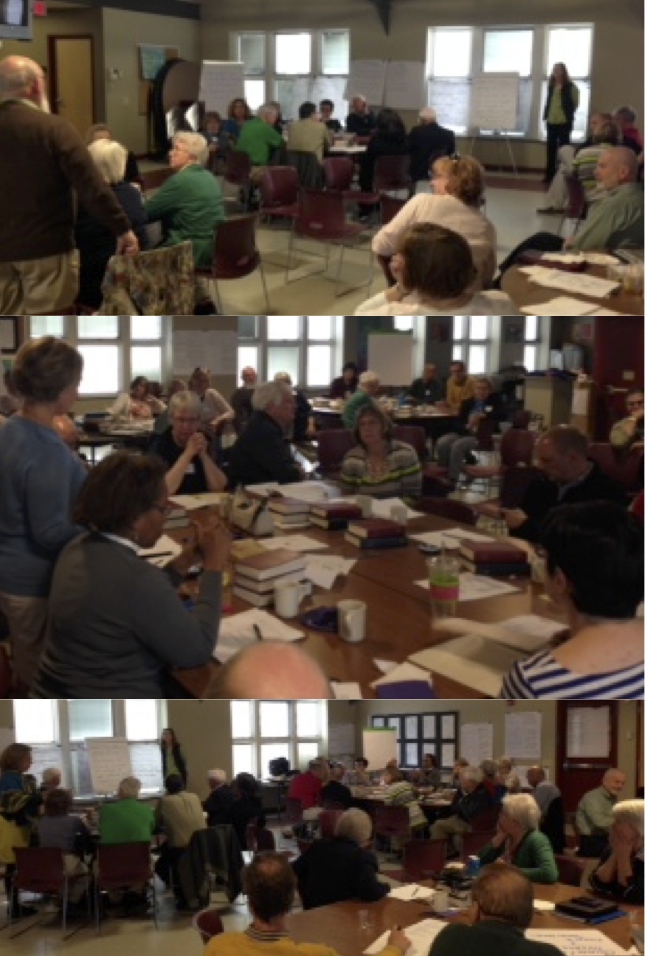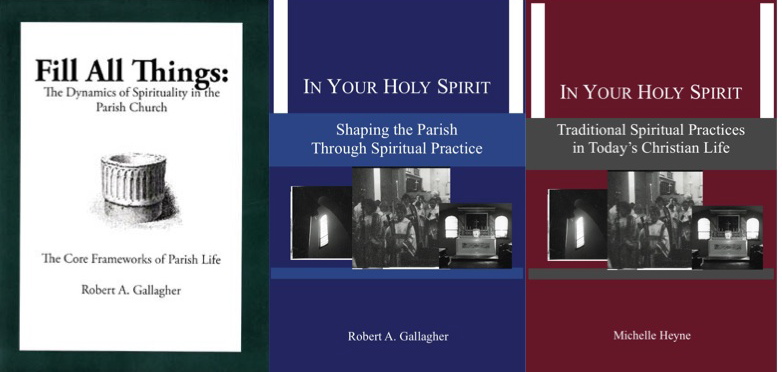CPA follow up
This page includes material we promised to provide as well as responses to some of you seeking particular resources.
Evaluation of the Day -- here's a summary of the evaluations
What can this group do in the interim to take into account the concerns and hopes address today?
 The Search Committee’s task is this:
The Search Committee’s task is this:
Because we held the Listening Events throughout the diocese, we are committed to reporting the results. Because reporting merely by posting the data analysis on the web is passive, and since we are structured on a convocational basis, we offer ourselves to Bishop Gepert at all convocation meetings to report and answer questions on the data analysis, with an aim to encouraging the clergy and apostolate attending to take the challenge of reflecting on the data back to their congregations.
The Standing Committee committed to overseeing the process of bringing the Diocesan canons into compliance with the National Church canons and to especially become more informed and compliant with the canons regarding the ordination process.
The Transition Committee is committed to being inclusive: to include people in the diocese, to include geographical areas of the diocese, in the various tasks we are assigned so that we can incorporate the many people and areas of the diocese, so all/many may feel they are included, have a voice, and we express an openness and transparency within the process.
Finance Committee and the Council of Trustees - The work the Finance Committee and the Council of Trustees will do is to continue the process now under way. That is to say, the finance committee will continue to work to seek clarity in the budget process, allocating the correct amounts to the correct departments; detail all staff costs appropriately; clarify the various designated funds held by the diocese and combine them as appropriate; simplify the budget format and post it on the diocesan web site in a timely manner. The Council of Trustees members present undertake to actively review how the budget process works so that decisions are made appropriately.
Resources for meetings - to improve listening, communication, open discussion
Fill All Things: The Dynamics of Spirituality in the Parish Church
Pages 107 - 121
In Your Holy Spirit: Shaping the Parish Through Spiritual Practice
Pages 91 - 106
In Your Holy Spirit: Traditional Spiritual Practices in Today's Christian Life
Pages 73 - 85

On Discernment: Communal Discernment, Discernment Readings, Discernment Guidelines, Discernment in Parish Life
Inclusion-Control-Affection (openness)
Resources for increasing spiritual practice, emotional intelligence and leadership strength
If you are interested in our thinking on this please look around this web site, especially the blog or our books. We are in conversation with two southern dioceses about beginning Shaping the Parish programs with them in 2015. Each will probably allow some participants from outside the diocese.
There is a form of workshop training that is very useful for many people in regard to increasing self awareness, an understanding of the impact we have on others and a group, and learning to better manage our emotions and moods. Here are a few resources --
Conflict Management Workshop, Diocese of Georgia. This is conducted each January. Here is the link to the 2014 program. The 2015 page will be posted in the coming weeks.
Several programs that use T-groups along with other methods to help participants do focused work on emotional intelligence. All are lab education programs.
National Training Labs - Offers a large number of experiential training workshops.
Center for Emotional Intelligence and Human Relations Skills - Training in emotional intelligence and human relations skills for seminarians, clergy and religious leaders.
Sites with information on T-groups
T-Groups, Feedback and Double-Loop Learning
T-Groups, facilitation and experience - History, role of Kurt Lewin
A T- Group with Ken Benne - In this 1988 tape Ken Benne, a colleague of Kurt Lewin's and a co-founder of NTL Institute in 1947, facilitates and comments on a one hour T-group. Benne plays a more active trainer role than we often experience. It appears that the participants are coming into this group with a significant amount of previous lab experience.
Videos and Webinars on Organization Development (OD) and T-groups

Resistance to Change
The Change Formula - A standard, easily understood tool from organization development. Places the issue of resistance to change within a broader context.
Awareness - Behavior Cycle - Michelle spoke of this during the session
Benedictine Spirituality
The Benedictine Promise and the Dynamics of the Spiritual Life
The Benedictine Spirit in Anglicanism
There is also a chapter in Fill All Things: The Dynamics of Spirituality in the Parish Church on "The Benedictine Promise" From that chapter --
An Exploration
The Benedictine tradition includes a promise of stability, obedience, and conversion of life. That "promise" is not only a commitment made in community, it is a lens into the inner life and dynamics of a community. We have seen the health of a parish that is grounded in a rich and complex prayer life; in which there is deep listening, both interpersonal and in communal discernment; and where there is an openness of minds and hearts to the future that God offers. We have also seen parishes that seem to express a shadow side - where stability is turned to frozenness and obsession with parish traditions; where obedience has either become legalism or has no hold at all; where conversion of life is the cover for self-absorption in which change is driven by sentimentality or political ideology. We know of parishes where there is an obsession with change and others with maintaining traditions.
Decide to be in Community
The parish will be a healthier place if members can own that they have decided to be in community and that they have decided to be in this particular parish community. Benedict’s position about grumbling is in chapter five where he reminds members that they have chosen to live in community. The Rule seems to assume that some things come along with a person’s decision to join, things like no grumbling, balance, worship, silence, and humility. In deciding to join a community we also decide to live within the particular ways of that community. How do we help people accept responsibility for the decision they have made?
Be explicit with potential members of the parish that to join is to decide to be part of a living community, to open oneself to the process of being influenced and shaped by others, and to participate in the mystery by which you will influence and shape others. It is to enter into the rhythms of the community’s life that will, in time, work their way into your mind and heart. We lose life to gain life, die to rise, become empty so we might be filled. The central mystery of Christian life is lived in the context of community, community with others and with God.
The consultant's view of the "Pause" idea
1. We don't have an opinion about whether you should move ahead with your current schedule or allow more time.
2. You can turn the issue into a fight that does more damage than pausing or not pausing will cause.
3. One thing you might do is get very specific with yourselves about the issues and concerns mentioned in the listening process, by the bishop, and in your conversations on Saturday. Make a list of all those items and then sort it:
- Which are best left to the work of your new diocesan bishop? For example -- It doesn't make sense to develop visions and long range plans that you then expect a new bishop to work with. That person needs to shape such visions and plans in collaboration with you. He or she will need to have an investment.
- Some items were more in the form of "wonderments" -- we wonder if there is a problem but don't really know; we need information. Get the information this month!
- What are items that could be cleared up in a few weeks or months?
- What items call for sustained work over a year or two? Can that be done in a parallel track while you move forward with your current search time line or does it require a pause or can it wait?
4. The information you gathered in many forms doesn't tell you what approach is best. For example, in the Diocesan Life Cycle responses they were all over on the side of static, decline and even disintegration. Based on that you can make a reasonable case for speeding up the process ("let's get someone in place as soon as possible"), or stay with the current schedule ("we need to show a steady and stable way forward") or a short lengthening ("we can improve a few things quickly with just a bit of time") or a longer pause ("this requires considerable time and effort, we need to be patient.").
5. There is a weakness in the basic systems of the diocese. You looked at the Critical Mass model using the competencies of spiritual practice & maturity, emotional intelligence, and leadership strength. Your group assessment was one of a diocese in trouble -- not enough strength at the center (yourselves really) around the three areas, not enough "glue," and an emotional inversion. You said much the same in assessing attention to the primary task and the dynamics of the Benedictine Promise. We know that most of you saw congruence between those initial assessments and what you heard in the listening process.
Background documents
- A PDF on the Benedictine Promise along with an assessment form
- PDF on the diocesan life cycle.
- The Three Primary Tasks of a Diocese – with an assessment worksheet
- A PDF on Developing Critical Mass in the Diocese
We did our own off-to-the-side assessment using Karl Albrecht’s "Four Key Systems Model." We based it on what we heard you saying about the diocesan system. We saw weakness in every system. It's a secular model so it requires some adaptation and experience to apply it to a religious system. For a diocese the "Technical System" would be all those things we do do develop healthy and faithful parish churches. The "Administrative System" is about the movement of information so that decisions can be made and implemented in a timely manner. The "Social System" involves matters of "glue," our satisfaction with the work, and helping people move together to accomplish what we desire. The "Strategic System" is the broad oversight and steering function.
An opportunity
We would urge you to accept a basic reality -- it usually takes as long to get out of a bad situation as it took to get into it. Think seven or eight years as a beginning. That doesn't say anything about the idea of a "pause." It says everything about an opportunity to become a healthier diocese; a community of persistence, patience, courage, and wisdom. It is an opportunity to grow as a community in humility, gentleness, patience, forbearance born of love, eagerness to maintain unity in the bond of peace, truthfulness mediated in love, mutual kindness, tenderheartedness and forgiveness; and in the Spirit's fruits of love, joy, peace, patience, kindness, generosity, faithfulness, gentleness and self-control.